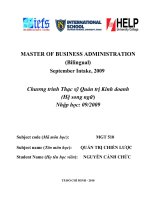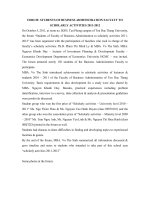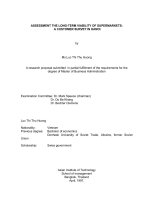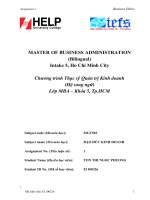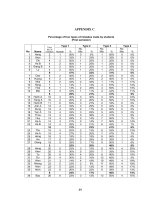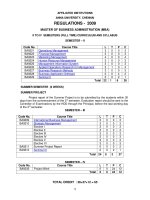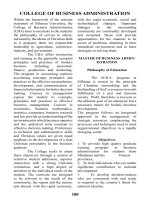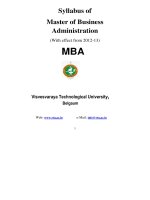University of Dayton School of Business Administration - Course Descriptions MBA Program ppt
Bạn đang xem bản rút gọn của tài liệu. Xem và tải ngay bản đầy đủ của tài liệu tại đây (189.17 KB, 21 trang )
1
University of Dayton
School of Business Administration
Course Descriptions
MBA Program
October 2011
2
MBA 600 A Introduction to Financial Accounting 1.5
An introduction to the concepts and procedures underlying financial accounting and the use of
financial statement and other financial accounting information for decision making.
No Prerequisite.
MBA 601 A Introduction to Managerial Accounting 1.5
An introduction to the concepts underlying the preparation and use of accounting data by
managers as they plan, control, and make decisions within the organization.
Prerequisite: MBA 600A.
MBA 602 A Information Assurance 3
An exploration of 1) the various ways that accounting provides forms of assurance to
information users in making important economic decisions through the use of traditional audit
methodologies and an expansion of the audit sphere into attestation and assurance practices, and
2) ethical obligations and decision making in accounting.
Prerequisite: ACC 401 or permission of instructor.
MBA 602 B Fraud Investigation 3
Study of topics related to the detection, investigation, and prevention of accounting fraud within a legal
and ethical environment. This course will concentrate on occupational fraud and financial statement
fraud.
Prerequisite: MBA 600A & 601A
MBA 603A Advanced Financial Accounting 3
Study of accounting for business combinations, consolidated financial statements, government
organizations, multinational subsidiaries and foreign currency transactions including an
introduction to IFRS.
Prerequisite: ACC 305 or permission of instructor.
3
MBA 604A Taxes and Business Strategy 3
Primary emphasis is given to developing a framework that articulates how effective tax planning
affects business decisions. An advantage of the framework over a strictly rules-based course is
that it can be applied to current and future tax regimes, as well as across tax jurisdictions.
Significant emphasis is given to understanding how to account for income taxes for financial
statement purposes. Although not primarily a rules-based course, application of the effective tax
planning framework to cases and problem-solving exercises will increase students' knowledge of
U.S. tax rules and the factors that shape them.
Prerequisite(s): ACC 305 and ACC 420.
MBA 604B Advanced Issues in Taxation 3
Study of the current federal income tax code and its application to individuals and business entities.
Emphasis is placed on the technical issues and planning opportunities that businesses face.
Prerequisite(s): ACC 420 or permission of instructor; MBA 600A, 601A
MBA 605A Contemporary Issues in Accounting 3
Seminar covering emerging or controversial accounting issues for the student who has a strong
accounting background. Topics include the business and financial situations that underlie accounting
problems and controversies, alternative accounting techniques which are accepted or proposed, and the
consequences of various accounting practices.
Prerequisite: ACC 306 or permission of instructor.
MBA 605B International Accounting 3
Study of current topics in international accounting. This course will typically include a week or
more of study outside of the U.S. that will include lectures and relevant site visits. In addition to
normal tuition, there may be travel and other costs or fees. Foreign locations, countries, topics,
and duration may vary.
Prerequisite: ACC 306 or permission of instructor.
4
MBA 606A Financial Statement/Risk Analysis 3
A study of the tools and techniques of financial statement analysis including consideration of
various alternatives and techniques and the impact of economics and accounting measurements.
Prerequisite: ACC 306 or permission of instructor.
MBA 607A Strategic Performance Measurement and Control:
A System’s Perspective 3
The design and use of performance measurement and control systems from an integrated systems
view of an organization. An important aspect of the course is to "think out of the box" in terms of
how to design more flexible and adaptive cost management and performance measurement
systems to help organizations become more flexible and responsive in meeting customer needs.
Performance measurement and control are discussed in light of an integrated systems view of an
organization, the principles of the Toyota Way, the Toyota Production System, and Lean
Accounting.
Prerequisite(s): ACC 303 and MBA 792 or permission of instructor.
MBA 608A Accounting Information Systems 3
A study of accounting information systems and their impact on management decision making
and control. Emphasis on the systems approach to the collection and reporting of accounting
data, system internal controls, and computer applications for managerial and financial
accounting.
Prerequisite(s): ACC 341 and MBA 660 or permission of instructor.
MBA 609A Special Topics in Accounting 3
Advanced and current topics in accounting. Topics vary.
Prerequisite: Permission of instructor.
5
MBA 609B Individual Research in Accounting 3 – 6
Individual research in accounting subjects under the guidance and direction of an accounting
faculty member. A formal proposal must be completed and approved by the faculty member,
Department Chair, and MBA Director prior to registration.
Prerequisite: Permission of instructor; strong academic and/or professional background in
accounting.
MBA 611 Statistical Analysis for Business Decisions 1.5
This course is an introduction to descriptive and inferential statistics for MBA students. The
overall purpose is for students to develop skills in (1) describing/summarizing sample data sets,
(2) using probability distributions, (3) drawing conclusions about the properties of large groups
when only sample information is available, and (4) investigating relationships among several
properties based on a sample of those properties.
No Prerequisite.
MBA 612 Principles of Operations Management 1.5
An introduction to both traditional and modern manufacturing and service systems, including
operating philosophies that drive these systems and the important tools and techniques used
therein.
Prerequisite: MBA 611.
MBA 613 JIT and Quality in Manufacturing and Services 3
Study of the concepts and techniques of just-in-time manufacturing, total quality systems, and
statistical process control. Projects, tours, and guest speakers.
Prerequisite: MBA 793.
6
MBA 614 Analysis of Factory Systems 3
Study of the concepts and techniques of analysis, design, and management of factory production
systems. Work-flow layout, scheduling techniques, stochastic process models, simulations and
computerized factory models. (May not be taken for credit if MBA 669 "Decision Support
Systems" has been completed.)
Prerequisite(s): MBA 611, 612 & 791.
MBA 617 Business Process Improvements 3
A study of the concepts and techniques of business process analysis and improvements as
building blocks for all operations improvement strategies, using a range of tools from simple
process-mapping to computer-based process-modeling. Balancing technical/analytical and
organizational/behavioral aspects of business process improvements are highlighted. The class
will include a business process analysis/improvement project using a process modeling software.
Prerequisite(s): MBA 611 & 612.
MBA 618 Operations Management Research Seminar 3
Individual research effort in conjunction with a faculty member. The seminar will meet several
times during the term for research progress presentations.
Prerequisite: One OPM elective.
MBA 619 Special Topics in Operations Management 3
Advanced or special topics in the analysis, design, operation, and maintenance of manufacturing
and service systems. Topics vary.
Prerequisite: Permission of instructor.
7
MBA 620A Principles of Corporate Financial Management 1.5
(formerly part of MBA 620)
Basic corporate financing principles including short-term financing, valuation of cash flows,
raising capital and cost of capital, capital structure and dividend policy, mergers and acquisitions.
Excel based cases are used extensively.
Prerequisite: MBA 600A.
MBA 620 B Principles of Corporate Investments and Assets Management 1.5
(formerly part of MBA 620)
Basic principles of asset management including financial statement analysis, cash and liquidity
management, time value of money, risk and return, capital budgeting. Excel based cases are
used extensively.
Prerequisite: MBA 620A.
MBA 621 Financial Derivates and Risk Management 3
This course provides a theoretical foundation for the pricing of contingent claims and for
designing risk-management strategies. It covers option pricing models, hedging techniques, and
trading strategies. It also includes portfolio insurance, value-at-risk measure, multistep binomial
trees to value American options, interest rate options, and other exotic options.
Prerequisite(s): FIN 301 and FIN 360 or MBA 625.
MBA 622 Advanced Corporate Finance 3
This course is focused upon interesting corporate finance issues addressing short term financial
management, long term capital budgeting, and long term financing choices. The course requires
that the students understand these issues through a series of cases and projects. A significant
amount of spreadsheet modeling together with both individual and group work will be required
to examine the cases and projects.
Prerequisite(s): MBA 620A & 620B.
8
MBA 624 Commercial Bank Management 3
Explores the environment in which banks must operate, the financial statements of banks, and a
thorough study of bank management topics, including asset-liability management, the investment
portfolio, sources of funds, and the loan portfolio.
Prerequisite(s): MBA 620A & 620B.
MBA 625 Investments and Financial Markets 3
A study of investment principles and techniques used by both individual and institutional
investors. Topics include bond and stock markets, security valuation methods, portfolio theory
and management, and investment institutions.
Prerequisite(s): MBA 620A & 620B.
MBA 626 International Financial Management 3
Integrates the international monetary environment with the multinational business firm and its
operations. Analyzes the balance of international payments and exchange rate determination.
Specific international financial management topics include export-import financing, foreign
direct investment, foreign exchange risk management, financial controls, and international
capital budgeting.
Prerequisite(s): MBA 620A & 620B.
MBA 628 Fixed Income Analysis 3
This class will expose students to a variety of fixed income instruments that are traded in the
financial markets, their investment characteristics, the state-of-art technology for valuing them,
technique for quantifying their interest rate risk, and portfolio strategies for using them. Great
course for CFA candidates, Fund Managers, Credit Risk Managers, Commercial Bankers and
anyone interested in investing in fixed income securities as alternatives to stocks.
Prerequisite(s): MBA 611, 620A & 620B.
9
MBA 629 Special Topics in Finance 3
In-depth application of financial principles to selected areas. Topics vary. Emphasis may be on
working capital management, capital budgeting, applied portfolio management, mergers and
acquisitions, corporate restructuring, or selected topics.
Prerequisite: Permission of instructor.
MBA 630 Principles of Marketing 1.5
Fundamentals of marketing, including macro and micro concepts that affect marketing
management. An introduction to marketing terminology, definitions, theories, concepts, and
practices. Emphasis on decision variables used by marketing managers, both at the domestic and
global level.
No Prerequisite.
MBA 632 Services Marketing 3
The course is designed to focus on marketing opportunities, challenges, methods, strategies, and
other aspects of marketing that are unique to services oriented businesses. The course
emphasizes the environmental approach to services marketing. The students are introduced to the
basic concepts of services marketing. The course material focuses on environment and on the
modifications of marketing theory and its applications in the services marketing organizations.
Prerequisite: MBA 630.
MBA 633 Sales Management 3
A study of the basic principles and practices of sales management. Rather than viewing sales
management as containing separate functions and activities, (such as staffing, training,
motivation), this course views them as having systemic relationships with each other. All
functions and activities will be viewed as a dynamic process, composed of numerous interrelated
parts; all aimed at helping the organization reach its sales objectives. Analyzes the structure of
the sales organization, determination of sales policies, selection, training, and motivation of
salesperson, and establishing sales territories, and quotas.
Prerequisite: MBA 630.
10
MBA 634 Consumer Behavior 3
Consumer Behavior is the study of those actions directly involved in obtaining, consuming, and
disposing of products and services, including the decision processes that precede and follow
these actions. Consumer behavior is of particular interest to those who, for various reasons,
desire to influence or change that behavior, including those whose primary concern is marketing,
consumer education and protection, and public policy. Consumer behavior is studied within the
context of marketing strategy, and market segmentation.
Prerequisite: MBA 630.
MBA 635 Market Analysis and Research 3
The purpose of marketing research is to provide decision makers with useful consumer and
customer information to reduce uncertainty about alternative courses of business action, and aid
in marketing management decision making and planning. To make the wisest decisions and
accomplish the best, this course focuses on showing decision makers how to effectively use
information provided by marketing research.
Prerequisite(s): MBA 611 & 630.
MBA 636 Multicultural Marketing 3
The course is designed to introduce students to the basic concepts and theories of multicultural
marketing. The main goals of this course are for students to acquire a basic understanding of the
elements of other cultures, to be aware of cultural differences, and to get students to appreciate
the importance of cultural adaptation in the marketing program, especially as they relate to the
development of marketing systems.
Prerequisite: MBA 630.
MBA 637 Global Marketing Management 3
Integration of concepts, theories, and analytical procedures associated with market analysis of
global markets. This course provides a managerial and strategic perspective on global marketing.
It is designed to assist students in developing appropriate business skills and making marketing
management decisions in the global context.
Prerequisite: MBA 630.
11
MBA 638 Product Planning and Development 3
Integration of various product management processes and concepts as customer-focused problem
solving. Using projects or simulations, provides an opportunity to practice skills in developing
and introducing a new product in a competitive environment. Emphasis on how various
techniques can be interpreted to answer questions about performance.
Prerequisite: MBA 630.
MBA 639 Special Topics in Marketing 3
Advanced and current topics in marketing, such as product management, consumer behavior,
services marketing, sales, and advertising.
Prerequisite: Permission of instructor.
MBA 640 Principles of Economics 1.5
Introduction to consumer and producer behavior in a market economy, demand and supply,
demand elasticity, production and cost, pricing and firm behavior in perfect competition and
imperfect competition. Macroeconomic topics include measures of output, inflation, the basics
of the Federal Reserve System, and taxes and the public debt.
No Prerequisite.
MBA 646 International Trade and Business Applications 3
This course introduces a comprehensive and up to date exposition of the theories and
applications of international trade that are essential for understanding and suggesting solutions to
the important contemporary international trade problems facing firms and managers. Topics
cover comparative advantage, gains from trade, imperfect competition and international trade,
trade and economic growth, trade policies, economic integration, resource movements and
multinational corporations.
Prerequisite: MBA 640.
12
MBA 649 Special Topics in Economics 3
Advanced and current topics in economics. Topics vary.
Prerequisite: Permission of instructor.
MBA 652 Social Responsibility and Ethical Dimensions of Management 3
Study of ethical responsibility in the business setting. Topics include the relationship of
management to society, ethical issues in management, the virtues of leaders, strategic
management for social responsiveness, management styles in the global marketplace, and the
stakeholder management concept.
Prerequisite: MBA 670.
MBA 653 Corporate Issues and Survey Practicum 3
An overview of management concepts, principles, and functionality as practiced by major
corporations. Each student has the opportunity to develop an innovative alternative to a current
issue related to corporate finance, marketing, and/or management. Includes presentations by a
team of corporate executives.
Prerequisite(s): Completion of all foundation courses.
MBA 656 International Culture and Management (Study abroad) 3
Study of international culture and business operations. This course will typically include a week
or more of study outside of the U.S. that will include lectures and relevant site visits. In addition
to normal tuition, there will be travel and other expenses. Locations, countries, and topics may
vary.
Prerequisite(s): Completion of all foundation courses or permission of faculty member.
MBA 659 Special Topics - Organizations and their Environments 3
Advanced and current topics in organizations and their environments. Topics vary.
Prerequisite: Permission of instructor.
13
MBA 660 Principles of Information Systems 1.5
An introduction to the basic technology underlying information systems and to the concepts and
techniques needed to analyze, design, and manage those systems.
No Prerequisite.
MBA 661 E-Commerce 3
This course provides an understanding of the information technologies that enable business-to-
business and business-to-consumer electronic commerce while focusing on the strategic,
operational, management, and societal issues associated with such technology-based commerce.
Business cases, experiential exercises, and guest speakers are utilized. This is a required course
for the Technology-Enhanced Business/E-Commerce (TEB) concentration.
Prerequisite: MBA 660.
MBA 662A Security Management for Information Systems (Unclassified) 3
Addresses issues relevant to creating and managing a systematic security process in
organizations. Information security policy, assets, physical and logical information resource
security, business continuity, and compliance with relevant security standards are covered.
Prerequisite: MBA 660 or equivalent.
MBA 662B Managing Telecommunication & Networking Sys. (Classified) 3
Introduction to management of computer-based communication networks. Includes underlying
concepts; basic hardware components and operating systems; network architectures and
protocols; data integrity and security; message routing; network resource management.
Prerequisite(s): MBA 662A or instructor permission; U.S. Department of Defense Interim
Secret Clearance or higher.
14
MBA 662C Managing Internet Security (Classified) 3
This course provides managers with an understanding of both defensive and offensive issues
surrounding the security of computer-based information networks. The course includes
instruction on theory about information security, psychological operations, hacking, viruses, and
network systems management, and security for e-commerce on the Internet.
Prerequisite(s): MBA 662B; U.S. Department of Defense Interim Secret Clearance or higher.
MBA 663 Management of Information Resources 3
Study of the strategic and management issues associated with the effective organizational use of
information technology. Role of the chief information officer; strategic planning, impacts and
alliances; information technology assimilation; information technology architectures, functional
organization, and operational control; information systems project management. Cases and
readings.
Prerequisite(s): MBA 660; and MBA 794 is recommended.
MBA 664 Database Management 3
Introduction to databases and their management. File organization and data structures; database
management systems; major data models; conceptual, logical, and physical database design; data
definition and manipulation with SQL; data administration; and client/server and distributed
databases. SQL-based software tool for database project.
Prerequisite: MBA 660.
MBA 665 Systems Analysis & Design 3
Introduction to object-oriented concepts and techniques for analyzing and designing systems.
Activities performed and models created during the different phases of the development life
cycle. Systems development project using a CASE tool.
Prerequisite(s): MBA 660 and 664.
15
MBA 667A Business Intelligence 3
This course is about developing a program for Business Intelligence in an organization. Will
cover the framework, concepts, methods, people skills, and technologies necessary for making
effective decisions fast. Also addresses issues from the capture of facts to the delivery of
information and decision support systems, including data quality, data warehousing, business
intelligence success factors and impact on organizations, business performance management
(dashboards and scorecards), multi-dimensional data analysis and online analytic processing,
data visualization, and applications of Business Intelligence.
Prerequisite(s): MBA 611, 660 & some SQL query language.
MBA 667B Data Warehousing 3
This course will emphasize the purpose, design, implementation, and effective use of data
warehouses and data warehousing technologies. Various schemas for the design of a data
warehouse, modeling time in a data warehouse, data quality management for building a data
warehouse from operational data stores and legacy applications, and technologies to populate
and retrieve information from data warehouses will be covered. Related topics of data marts,
analytical processing, data mining, and active data warehousing will also be addressed.
Prerequisite(s): MBA 660 & MBA 664 or database management coursework or relevant
database management experience.
MBA 668 Advanced Web Site Development 3
This course covers issues involved in developing Web sites for business usage. Issues covered or
investigated include: site layout, implementation and management, good site design practices,
connecting Web sites to company data, and processing secure transactions across the Web.
Prerequisite(s): HTML and a high-level programming language or instructor’s permission.
MBA 669 Special Topics in Management Information Systems 3
Advanced and current topics in management information systems. Topics vary.
Prerequisite: Permission of instructor.
16
MBA 670 Principles of Organizational Behavior (OB ) 1.5
Focuses on studying the behaviors of individuals and groups in organizational settings. Since
people drive organizational performance and competitive advantage, the long-term financial
success of the firm depends on successful behavior management. The course explores how
personality, values, and attributions shape the way employees perceive and respond to their
increasingly diverse work environments. Also covered are how decision-making processes,
group dynamics, and leadership styles impact employee behavior. Finally, the course examines
how employee behavior is influenced by culture, firm design, and organizational change.
No Prerequisite.
MBA 676 International Management 3
This course focuses on international aspects of organizational behavior, human resource
management, labor relations, corporate strategy, and ethical issues and revolves around three
objectives: examining the applicability of theory and research in the international management
area; surveying topical issues in international management; and developing students'
international management skills.
Prerequisite: MBA 670.
MBA 679 Special Topics in Management and Entrepreneurship 3
Analysis and interpretation of research studies as applied to management and entrepreneurship.
Coverage of issues such as leadership, interpersonal conflict resolution, competitive analysis,
new venture issues, resistance to change, managerial development, organizational growth, effects
of technology, and emergence of new control systems. Role playing, small group exercises and
applications.
Prerequisite: Permission of instructor.
17
MBA 680 Entrepreneurship and the Family Firm 3
Covers phases in the life span of the owner-managed enterprise and ending with succession to a
next generation of management through any of a variety of means. Major topic areas include
startup issues, business planning, financing, marketing, managing the growing firm, and
succession in a family business context.
Prerequisite(s): Completion of all foundation courses.
MBA 682 New Venture Management 3
A study of entrepreneurship and development of opportunities in new or renewed businesses.
Focus is on identifying and analyzing business opportunities, locating and obtaining venture
capital, developing a business plan, managing growth in the enterprise, and the decision-making,
risk-taking, and leadership styles of entrepreneurs.
Prerequisite(s): MBA 620 A, 620 B and 630.
MBA 684 Competitive Analysis 3
An in-depth exposure to the theory and tools of competitive analysis and provide practice in their
application. Learn to use various models and analysis tools for interpreting tactical and strategic
implications of evolutionary and revolutionary shifts in competitive environments, including
entrepreneurial and international situations.
No Prerequisite.
MBA 695 Individual Research 1 – 6
Individual research in subjects encompassed by the MBA curriculum under the guidance and
direction of a faculty member. Research may be undertaken on completion of 12 hours of post-
foundation coursework. A formal proposal must be completed and approved by the faculty
advisor and the MBA Director prior to registration.
Prerequisite(s): Permission of faculty advisor and MBA Director.
18
MBA 758 Principled Organization: Integrating Faith, Ethics, and Work 3
Students draw on our Catholic Social Teaching and Marianist Heritage to explore issues related
to the role of business as a high calling, a critical profession for the good of society and its
citizens. Besides the importance of contributing and acting ethically, we delve into the benefit of
integrating these values with current issues in business and its relationship to society. To do so
extensive conversations with active business people and reflections on relevance of ideas
discussed to personal goals and beliefs are central to the course.
No Prerequisite.
MBA 790 Managerial Economics 1.5
(formerly part of MBA 691)
Application of economic models to managerial decision making. Topics include basic
estimation techniques, demand analysis and forecasting, production and cost estimation, profit
maximization in competitive markets and in markets where firms have market power, and game
theory basics with attention to strategic decision making in oligopoly market and duopoly
models.
Prerequisite: MBA 640.
MBA 791 Modeling and Analysis for Business Decisions 1.5
(formerly part of MBA 691)
This course examines the role of analytic thinking and analytic models/techniques in providing
support and insight for business decisions. An overall framework for quantitative analysis within
business decision making is presented. Both optimization and descriptive modeling are studies.
Analysis techniques such as linear programming, integer and nonlinear optimization, and
simulation modeling are covered. The course will emphasize the application of analytic
techniques to business decisions with cases and executive partners form the business community.
Prerequisite: MBA 611.
19
MBA 792 Performance Measurement and Control System’s Perspective 1.5
(formerly part of MBA 692)
This core MBA course addresses the important cost management and measurement issues
relevant to any organization. The competitive and rapidly changing environment faced by most
organizations has rendered most traditional cost management, accounting control systems, and
methods of performance measurement and analysis ineffective and in some cases even
dysfunctional.
Prerequisite(s): MBA 600A and 601A.
MBA 793 Operational Effectiveness 1.5
(formerly part of MBA 692)
Operational effectiveness is a multidimensional concept that industry has approached in a variety
of ways. This course focuses on the underlying principles that drive operational improvements.
These principles are used as a basis to develop skills in identifying improvement opportunities,
analytical tools to quantify the problem and solution set, and quantitative and policy approaches
to maintaining performance once improved.
Prerequisite: MBA 612.
MBA 794 Information Systems & Business Decisions 1.5
(formerly part of MBA 693)
Information is a key organizational asset. Information systems and technology are pervasive in
organizations with the goal of enabling efficiency, effectiveness, and adaptability. Through the
analysis of case studies, this course covers what general managers need to know: 1) to make
decisions about information systems to achieve organizational goals and 2) to fulfill their role in
managing information assets in organizations. It emphasizes the role of information and
technology in organizational decision-making.
Prerequisite: MBA 660.
20
MBA 795 Organizational Behavior 1.5
(formerly part of MBA 693)
The Organizational Behavior course focuses on what makes a workplace effective, efficient,
positive, and pleasant. Topics covered include how people make decisions, how employees work
together, and how employers can manage employees for maximum productivity. Students will
learn about employee compensation and motivation, team dynamics, and what makes a good
leader. Students will also learn how norms, values, incentives, and rewards shape behavior in
organizations. The course also includes topics such as organizational behavior in the world of the
internet, and how the globalization of business impacts communication within an organization.
Organizational Behavior is interdisciplinary, involving the fields of psychology, sociology,
gender studies, labor economics, business, human resources, management, and many others. As
such, the course will study theories in many interdisciplinary fields. Ultimately, the course
focuses on how managers become effective leaders by addressing the human side of enterprise.
Prerequisite: MBA 670.
MBA 796 Corporate Finance 1.5
(formerly part of MBA 694)
This course in corporate finance builds on the basic principles foundation constructed in
MBA620 A & B. Topics include financial analysis, capital budgeting, the cost of capital,
valuation (including acquisitions), and international corporate finance. We continue to use the
unifying theme of creating shareholder value to guide our analysis and decision making to solve
complex financial problems. Students will be introduced to the issues through lectures,
discussions and readings, and analyzing cases
Prerequisite: MBA 620A & 620B.
MBA 797 Marketing Management 1.5
(formerly part of MBA 693)
Effective marketing is a customer-focused process that pervades an organization. This course
focuses on strategic decision making and explores marketing opportunities through product
development, pricing strategies, customer communications and channel management. Students
learn how to assess business opportunities, research a market, segment markets, and position a
firm's offerings in order to create long-term customer and shareholder value.
Prerequisite: MBA 630.
21
MBA 798 Business Strategy 3
(formerly MBA 698)
First of a two-course set of capstone integrative experiences which explores the process of
creating, sustaining, and growing successful businesses in an era of change. The course deals
with strategic decision making and stakeholder management related to competitive, economic,
political, social, cultural, and technological environments in small, medium, and large companies
in service and manufacturing settings.
Prerequisite(s): MBA 790, 791, 792, 793, 794, 795, 796 and 797. Undergraduate degree in
business administration within the last three years, fulfillment of all foundation courses.
MBA 799 Integrative Project 3
(formerly MBA 699)
Second of the two-course set of capstone integrative experiences that explores the process of
creating, sustaining, and growing successful businesses in an era of change. Students work in
teams to analyze the strategic environment of a firm and develop a series of recommended
actions. Students gain experience in working in a team environment in a non-academic setting,
and experience the pressure of delivering a high-quality product to company leaders. The
approach taken is tailored to the specific needs of the business as well as the talents of the
particular student team.
Prerequisite: MBA 798
